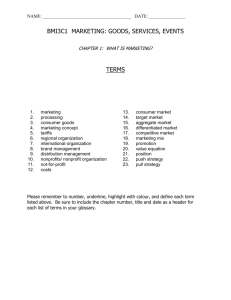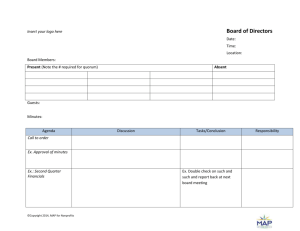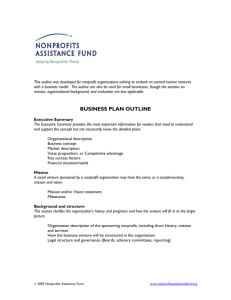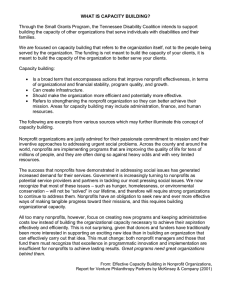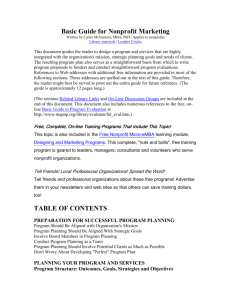Remarks, ARNOVA Award for Distinguished Achievement and
advertisement
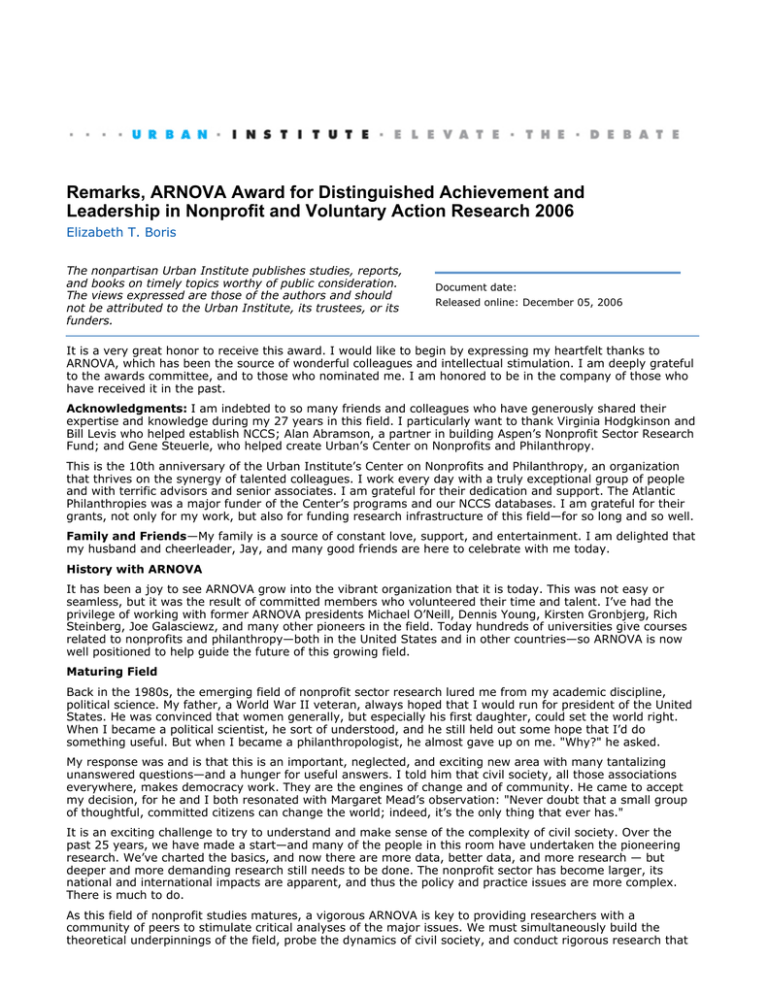
Remarks, ARNOVA Award for Distinguished Achievement and Leadership in Nonprofit and Voluntary Action Research 2006 Elizabeth T. Boris The nonpartisan Urban Institute publishes studies, reports, and books on timely topics worthy of public consideration. The views expressed are those of the authors and should not be attributed to the Urban Institute, its trustees, or its funders. Document date: Released online: December 05, 2006 It is a very great honor to receive this award. I would like to begin by expressing my heartfelt thanks to ARNOVA, which has been the source of wonderful colleagues and intellectual stimulation. I am deeply grateful to the awards committee, and to those who nominated me. I am honored to be in the company of those who have received it in the past. Acknowledgments: I am indebted to so many friends and colleagues who have generously shared their expertise and knowledge during my 27 years in this field. I particularly want to thank Virginia Hodgkinson and Bill Levis who helped establish NCCS; Alan Abramson, a partner in building Aspen’s Nonprofit Sector Research Fund; and Gene Steuerle, who helped create Urban’s Center on Nonprofits and Philanthropy. This is the 10th anniversary of the Urban Institute’s Center on Nonprofits and Philanthropy, an organization that thrives on the synergy of talented colleagues. I work every day with a truly exceptional group of people and with terrific advisors and senior associates. I am grateful for their dedication and support. The Atlantic Philanthropies was a major funder of the Center’s programs and our NCCS databases. I am grateful for their grants, not only for my work, but also for funding research infrastructure of this field—for so long and so well. Family and Friends—My family is a source of constant love, support, and entertainment. I am delighted that my husband and cheerleader, Jay, and many good friends are here to celebrate with me today. History with ARNOVA It has been a joy to see ARNOVA grow into the vibrant organization that it is today. This was not easy or seamless, but it was the result of committed members who volunteered their time and talent. I’ve had the privilege of working with former ARNOVA presidents Michael O’Neill, Dennis Young, Kirsten Gronbjerg, Rich Steinberg, Joe Galasciewz, and many other pioneers in the field. Today hundreds of universities give courses related to nonprofits and philanthropy—both in the United States and in other countries—so ARNOVA is now well positioned to help guide the future of this growing field. Maturing Field Back in the 1980s, the emerging field of nonprofit sector research lured me from my academic discipline, political science. My father, a World War II veteran, always hoped that I would run for president of the United States. He was convinced that women generally, but especially his first daughter, could set the world right. When I became a political scientist, he sort of understood, and he still held out some hope that I’d do something useful. But when I became a philanthropologist, he almost gave up on me. "Why?" he asked. My response was and is that this is an important, neglected, and exciting new area with many tantalizing unanswered questions—and a hunger for useful answers. I told him that civil society, all those associations everywhere, makes democracy work. They are the engines of change and of community. He came to accept my decision, for he and I both resonated with Margaret Mead’s observation: "Never doubt that a small group of thoughtful, committed citizens can change the world; indeed, it’s the only thing that ever has." It is an exciting challenge to try to understand and make sense of the complexity of civil society. Over the past 25 years, we have made a start—and many of the people in this room have undertaken the pioneering research. We’ve charted the basics, and now there are more data, better data, and more research — but deeper and more demanding research still needs to be done. The nonprofit sector has become larger, its national and international impacts are apparent, and thus the policy and practice issues are more complex. There is much to do. As this field of nonprofit studies matures, a vigorous ARNOVA is key to providing researchers with a community of peers to stimulate critical analyses of the major issues. We must simultaneously build the theoretical underpinnings of the field, probe the dynamics of civil society, and conduct rigorous research that can be used to improve nonprofit practice and public policies. This latter task has taken on some urgency in light of the current Congressional interest in nonprofits. We have just experienced a transforming election. Congressional scrutiny of the nonprofit sector, however, will continue. The Senate Finance Committee is likely to pursue their investigations and agenda for reform. The nonprofit scandals of the past few years, combined with the increased size and complexity of nonprofits, makes them subject to the same forces that determined the election—demands for honesty, accountability, and performance. In the words of the universal Inca greeting I learned in Peru this fall: "Don’t lie, don’t cheat, and don’t be lazy." Clear-headed research has a critical role to play in meeting these demands and ARNOVA is at the center of vetting and disseminating the research. In Washington, D.C., unrealistic myths about charity coexist with overblown cynicism about nonprofits. Given this policy environment, I would like to touch on three policy issues that concern me. First, let’s talk about charitability. It’s possible that the definition of what is charitable will be narrowed from the broad mandate—to operate for the public good as spelled out in the tax code—to something more akin to the common usage of the term charity—assistance to the poor. Such a standard could differentiate between charities that deserve tax exemption or tax-deductible status and those that do not. Hospitals are in the spotlight currently, and higher education is not far behind—and there will be others. Nonprofit tax status could depend on serving the poor or it could depend on whether nonprofits rely mostly on donations and volunteers or on commercial or government revenues. Yet the reality is that for many organizations, the mix of constituents and revenues is quite complex, and government policies often shape both who is served and the resources available. As researchers, we need to investigate the implications of the trends and the policy options and describe what such standards could mean. Maybe there is an opportunity to draw some meaningful distinctions among nonprofits. Or not. At least the debate needs the benefit of our best analytical thinking. Second, let’s talk about performance. The sector needs a paradigm change in the way that charities are rated. We need measures that combine a healthy mix of efficiency and effectiveness, leavened by common sense. Donors increasingly demand that nonprofits document their performance. Nonprofits themselves want feedback on how they are doing. The difficulty of measuring outcomes makes this an expensive process, one that is out of the ballpark for many nonprofits. There are few indicators of success for some of the fundamental roles nonprofits play—creating social capital, promoting civic participation, creating art and music. The risks are marginalizing certain areas of civil society and latching onto overly simple, potentially harmful measures, such as administrative cost ratios. To some extent, we’ve done both. We need a paradigm change — from measuring how little nonprofits spend on administering their programs to how much they produce for society—or how much an additional dollar invested gains in returns. We need to develop new tools as well as new approaches to performance measurement. They need to be low cost and appropriate for the type of organization and its size. Finally, let's consider nonprofit finances. The finances of nonprofits are complex and require more fine-grained analysis by type and size of organization. The mix of highly uncertain funding and lack of access to capital are problems for many. We need to explore and help frame options allowing public policy to address the real difficulties of financing nonprofits. Tax credits, payments, bonds, and dedicated revenues should be right up there on the policy agenda along with how to prevent abuse and encourage accountability and high performance. Many important issues remain that demand creative investigation and thoughtful analysis, so many that I regret not being at the beginning of my career. I wish you all tremendous success in your research endeavors and I hope that you have as much fun in this field as I have had. Thank you again for honoring me—I applaud all of you for the work you are doing and for the work you will do. Other Publications by the Authors Elizabeth T. Boris Usage and reprints: Most publications may be downloaded free of charge from the web site and may be used and copies made for research, academic, policy or other non-commercial purposes. Proper attribution is required. Posting UI research papers on other websites is permitted subject to prior approval from the Urban Institute—contact publicaffairs@urban.org. If you are unable to access or print the PDF document please contact us or call the Publications Office at (202) 261-5687. Disclaimer: The nonpartisan Urban Institute publishes studies, reports, and books on timely topics worthy of public consideration. The views expressed are those of the authors and should not be attributed to the Urban Institute, its trustees, or its funders. Copyright of the written materials contained within the Urban Institute website is owned or controlled by the Urban Institute. Source: The Urban Institute, © 2012 | http://www.urban.org
